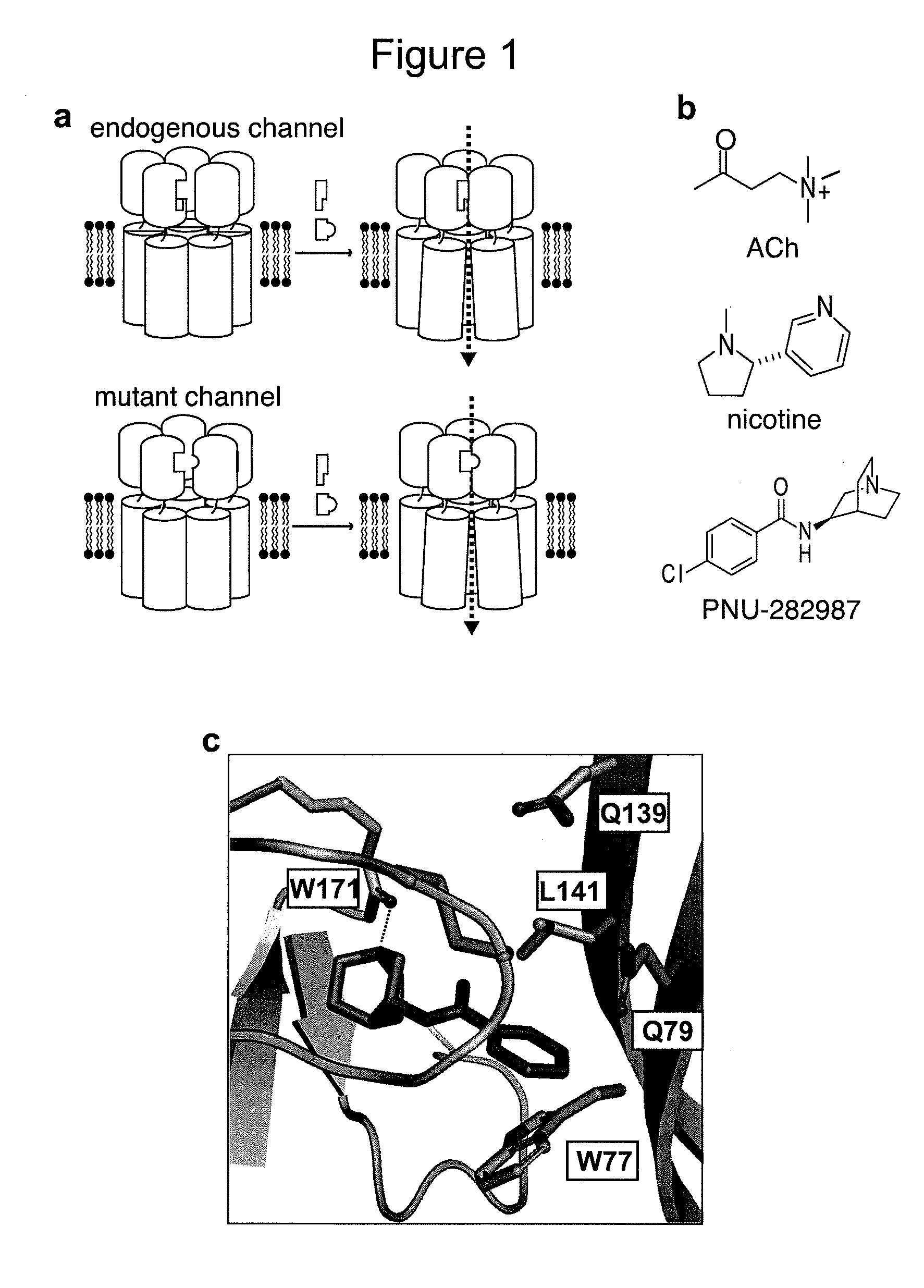Novel chimeric ligand-gated ion channels and methods of use thereof
a ligand-gated ion channel and chimeric technology, applied in the direction of immunological disorders, drug compositions, peptides, etc., can solve the problems of significant undesired side effects, invasive techniques, and perturbations within the targeted brain region that are not cell type-specific, and achieve the effect of increasing the activity of the neuron population and reducing the neuron population population
- Summary
- Abstract
- Description
- Claims
- Application Information
AI Technical Summary
Problems solved by technology
Method used
Image
Examples
example 1
Generation of Mutants of the α7 Nicotinic Acetylcholine Receptor Ligand Binding Domain
[0096]To engineer non-natural pharmacology into the ligand binding domain (LBD) of the α7 nicotinic acetylcholine receptor (nAChR), a model of the ligand-ion channel interaction was developed. This homology model was based on the x-ray crystal structure of the snail acetylcholine binding protein (AChBP) bound to nicotine (Celie et al. (2004) Neuron, Vol. 41: 907-914). The homology model was generated by aligning the sequence from the rat α7 nAChR with the crystal structure of Lymnaea stagnalis (great pond snail) AchBP bound to nicotine (PDB 1UW6) using PROMALS3D (http: / / prodata.swmed.edu / promals3d). All computational modeling was done within the Chameleon software package. Insertions and deletions in the α7 nAChR sequence relative to AchBP were modeled by search of the Protein Data Bank (PDB) for secondary structure elements with similar termini, using a sliding window through the α7 sequence. Prot...
example 2
Functional Characterization of α7 nAChR-5HT3 Chimeric Receptor Mutants
[0100]As described in Example 1, the human / mouse α7-5HT3 chimeric receptor was used as a template to generate the point mutations in the α7 LBD. This chimeric receptor expresses well in heterologous cell culture systems and it exhibits slower desensitization kinetics relative to the native α7 nAChR (Eisele et al. (1993) Nature, Vol. 366: 479-483). HEK 293 cells (ATCC CRL-1573) were transfected with a single plasmid encoding one of the seventy six single α7-5HT3 receptor mutants using a commercial transfection reagent (FuGene HD, Roche Applied Science). Each of the seventy six different α7-5HT3 receptor mutants were prescreened for ion channel function and cell surface expression.
[0101]Ion channel function was measured using a commercially available fluorescence-based membrane potential (MP) assay (MDS Analytical Technologies). Briefly, the MP assay involves loading cells expressing the chimeric receptors with a vo...
example 3
Identification of Selective Ligands for Mutant α7 nAChR-5HT3 Chimeric Receptors
[0103]A focused 71-membered library of 3-aminoquinuclidine benzamides was synthesized (FIG. 2). Representative chemical synthesis procedures for some of the compounds in the library are listed at the end of this Example. It was previously reported that α7-5HT3 is preferentially activated by the R enanantiomer of 3-aminoquinuclidine benzamide (Bodnar et al. (2005) Journal of Medicinal Chemistry, Vol. 48: 905-908). Furthermore, the 2′-substitution of the benzamide and bulky 4′-benzamide substituents were reported to most adversely affect activity of the α7-5HT3 chimeric receptor. Thus, we biased our library of molecules towards substitutents that would be least active against the α7-5HT3 “wild type” (wt) receptor. Additionally, the S enantiomers for many of the compounds were also synthesized.
[0104]Using the MP assay, we measured 1118 dose response curves against 43 α7-5HT3 single amino acid mutations and t...
PUM
| Property | Measurement | Unit |
|---|---|---|
| current amplitude | aaaaa | aaaaa |
| current | aaaaa | aaaaa |
| collection wavelengths | aaaaa | aaaaa |
Abstract
Description
Claims
Application Information
 Login to View More
Login to View More - R&D
- Intellectual Property
- Life Sciences
- Materials
- Tech Scout
- Unparalleled Data Quality
- Higher Quality Content
- 60% Fewer Hallucinations
Browse by: Latest US Patents, China's latest patents, Technical Efficacy Thesaurus, Application Domain, Technology Topic, Popular Technical Reports.
© 2025 PatSnap. All rights reserved.Legal|Privacy policy|Modern Slavery Act Transparency Statement|Sitemap|About US| Contact US: help@patsnap.com



